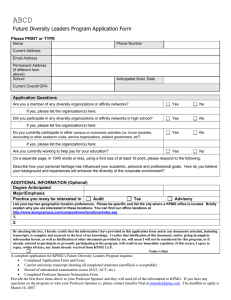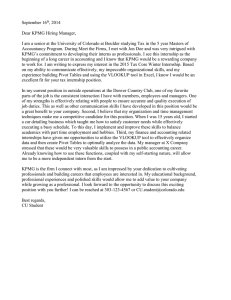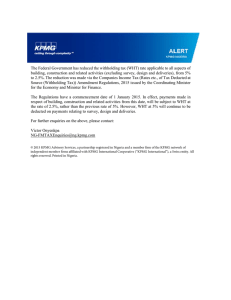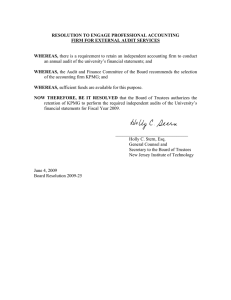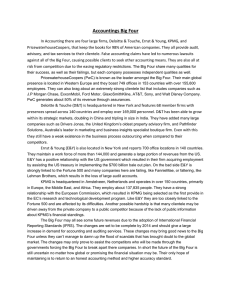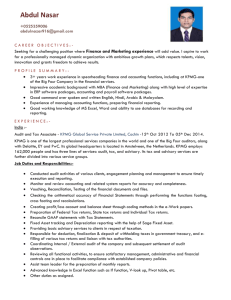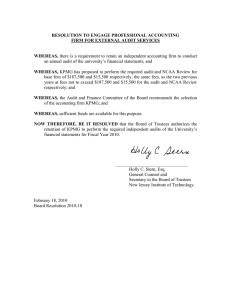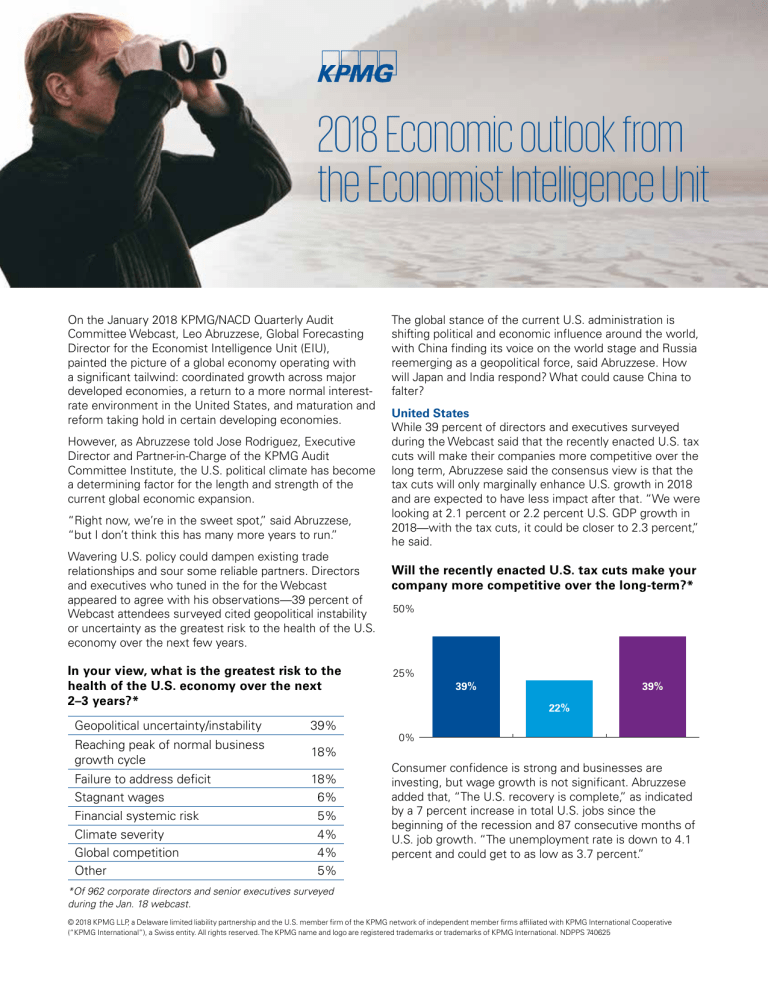
2018 Economic outlook from
the Economist Intelligence Unit
On the January 2018 KPMG/NACD Quarterly Audit
Committee Webcast, Leo Abruzzese, Global Forecasting
Director for the Economist Intelligence Unit (EIU),
painted the picture of a global economy operating with
a significant tailwind: coordinated growth across major
developed economies, a return to a more normal interestrate environment in the United States, and maturation and
reform taking hold in certain developing economies.
However, as Abruzzese told Jose Rodriguez, Executive
Director and Partner-in-Charge of the KPMG Audit
Committee Institute, the U.S. political climate has become
a determining factor for the length and strength of the
current global economic expansion.
“Right now, we’re in the sweet spot,” said Abruzzese,
“but I don’t think this has many more years to run.”
Wavering U.S. policy could dampen existing trade
relationships and sour some reliable partners. Directors
and executives who tuned in the for the Webcast
appeared to agree with his observations—39 percent of
Webcast attendees surveyed cited geopolitical instability
or uncertainty as the greatest risk to the health of the U.S.
economy over the next few years.
In your view, what is the greatest risk to the
health of the U.S. economy over the next
2–3 years?*
Geopolitical uncertainty/instability
39%
Reaching peak of normal business
growth cycle
18%
Failure to address deficit
Stagnant wages
Financial systemic risk
Climate severity
Global competition
Other
18%
6%
5%
4%
4%
5%
The global stance of the current U.S. administration is
shifting political and economic influence around the world,
with China finding its voice on the world stage and Russia
reemerging as a geopolitical force, said Abruzzese. How
will Japan and India respond? What could cause China to
falter?
United States
While 39 percent of directors and executives surveyed
during the Webcast said that the recently enacted U.S. tax
cuts will make their companies more competitive over the
long term, Abruzzese said the consensus view is that the
tax cuts will only marginally enhance U.S. growth in 2018
and are expected to have less impact after that. “We were
looking at 2.1 percent or 2.2 percent U.S. GDP growth in
2018—with the tax cuts, it could be closer to 2.3 percent,”
he said.
Will the recently enacted U.S. tax cuts make your
company more competitive over the long-term?*
50%
25%
39%
39%
22%
0%
Consumer confidence is strong and businesses are
investing, but wage growth is not significant. Abruzzese
added that, “The U.S. recovery is complete,” as indicated
by a 7 percent increase in total U.S. jobs since the
beginning of the recession and 87 consecutive months of
U.S. job growth. “The unemployment rate is down to 4.1
percent and could get to as low as 3.7 percent.”
*Of 962 corporate directors and senior executives surveyed
during the Jan. 18 webcast.
© 2018 KPMG LLP, a Delaware limited liability partnership and the U.S. member firm of the KPMG network of independent member firms affiliated with KPMG International Cooperative
(“KPMG International”), a Swiss entity. All rights reserved. The KPMG name and logo are registered trademarks or trademarks of KPMG International. NDPPS 740625
Consumer sentiment is high and consumer balance
sheets are less leveraged. Business investment has
responded to demand over the past several years, and
Abruzzese believes that higher profits from corporate
tax cuts will be returned to investors. On the horizon,
however, is the potential for as many as seven interest
rate hikes over the next two years by the Federal Open
Markets Committee, which could help bring an end to the
current expansion in 2020.
Global outlook
In the Euro zone, the multiyear recovery is now “stronger
and broader,” while Brexit-related issues and negotiations
have contributed to slower U.K. growth—”it’s a protracted
process.” Political risk remains “a source of vulnerability,
but the contagion threat is limited,” said Abruzzese.
The 19th Party Congress in October “confirmed
President Xi Jinping as most powerful leader of China
since Mao Zedong,” said Abruzzese. “Xi has centralized
power, ousted rivals, and tightened controls. We’re used
to viewing China as an economic force, but now it’s
emerging as a political force as well,” said Abruzzese.
By not identifying an heir apparent, Xi may try to extend
his presidency beyond 2022. China’s private nonfinancial
sector debt is expected to rise to more than 250
percent of GDP by 2022, above peak indebtedness that
precipitated several modern credit crises around the
globe, but Xi remains committed to 6.5 percent growth in
2018. In response to a question from Rodriguez about the
impact of China’s declining purchases of U.S. government
debt, Abruzzese said that with rising rates, “a bond buyer
such as China may be less interested in buying.”
Growth in India is expected to accelerate to nearly
8 percent in 2018 as the services sector expands and
domestic consumption fuels growth.
For the full replay and other highlights, visit
kpmg.com/aciwebcast.
About the KPMG Board Leadership Center
The KPMG Board Leadership Center champions outstanding
governance to help drive long-term corporate value and
enhance investor confidence. Through an array of programs and
perspectives—including KPMG’s Audit Committee Institute, the
WomenCorporateDirectors Foundation, and more—the Center
engages with directors and business leaders to help articulate
their challenges and promote continuous improvement of
public- and private-company governance. Drawing on insights
from KPMG professionals and governance experts worldwide,
the Center delivers practical thought leadership—on risk and
strategy, talent and technology, globalization and compliance,
financial reporting and audit quality, and more—all through a
board lens. Learn more at kpmg.com/blc.
Contact us
kpmg.com/blc
T: 1-877-576-4224
E: us-kpmgmktblc@kpmg.com
Latin America’s largest economies, specifically Brazil
and Colombia, are expected to grow faster in 2018,
though the pace of growth in Mexico is not expected to
move, said Abruzzese, who believes that the “business
community wants NAFTA” and that “it will change, but
not disappear.”
In Saudi Arabia, the recent anti-corruption initiatives
of Deputy Crown Prince Muhammad bin Salman have
drawn “broad support” while the country prepares for
the eventual public listing of state oil company Aramco
this year. And African economies are diverging as growth
slows among the continent’s largest countries, including
Nigeria and South Africa, while reform-focused, less
resource-dependent countries such as Ghana, Kenya, and
Tanzania experience rapid growth.
Even as challenges emerge, global GDP growth of
2.9 percent is expected, according to an EIU aggregate
analysis. Yet, for 2018 and beyond, the EIU enumerates
five key economic risks for companies and boards to
consider:
1.
Interest rates and bond yields, key indicators of
the cost of capital, are increasing in most markets.
How will investors react?
2. Easy money policies from central banks compelled
investors to look for alternate sources of return,
driving up asset prices, particularly real property
and equity.
3. Capacity constraints in the U.S. and China, in
particular, raise the specter of inflation.
4. Unwinding central bank balance sheets of
assets acquired following the financial crisis is
unprecedented and fraught with challenges.
5. China’s ability to manage its own debt could
develop into its own crisis.
Audit Committee Institute
Part of the Board Leadership Center, KPMG’s Audit
Committee Institute focuses on oversight of financial
reporting and audit quality and other issues of interest to
audit committee members, including risk oversight, internal
controls, and compliance. Learn more at kpmg.com/aci.
kpmg.com/socialmedia
The views and opinions expressed herein are those of the speakers and do not necessarily
represent the views and opinions of KPMG LLP.
The information contained herein is of a general nature and is not intended to address
the circumstances of any particular individual or entity. Although we endeavor to provide
accurate and timely information, there can be no guarantee that such information is accurate
as of the date it is received or that it will continue to be accurate in the future. No one
should act upon such information without appropriate professional advice after a thorough
examination of the particular situation.
© 2018 KPMG LLP, a Delaware limited liability partnership and the U.S. member firm of
the KPMG network of independent member firms affiliated with KPMG International
Cooperative (“KPMG International”), a Swiss entity. All rights reserved. The KPMG name and
logo are registered trademarks or trademarks of KPMG International. NDPPS 740625

